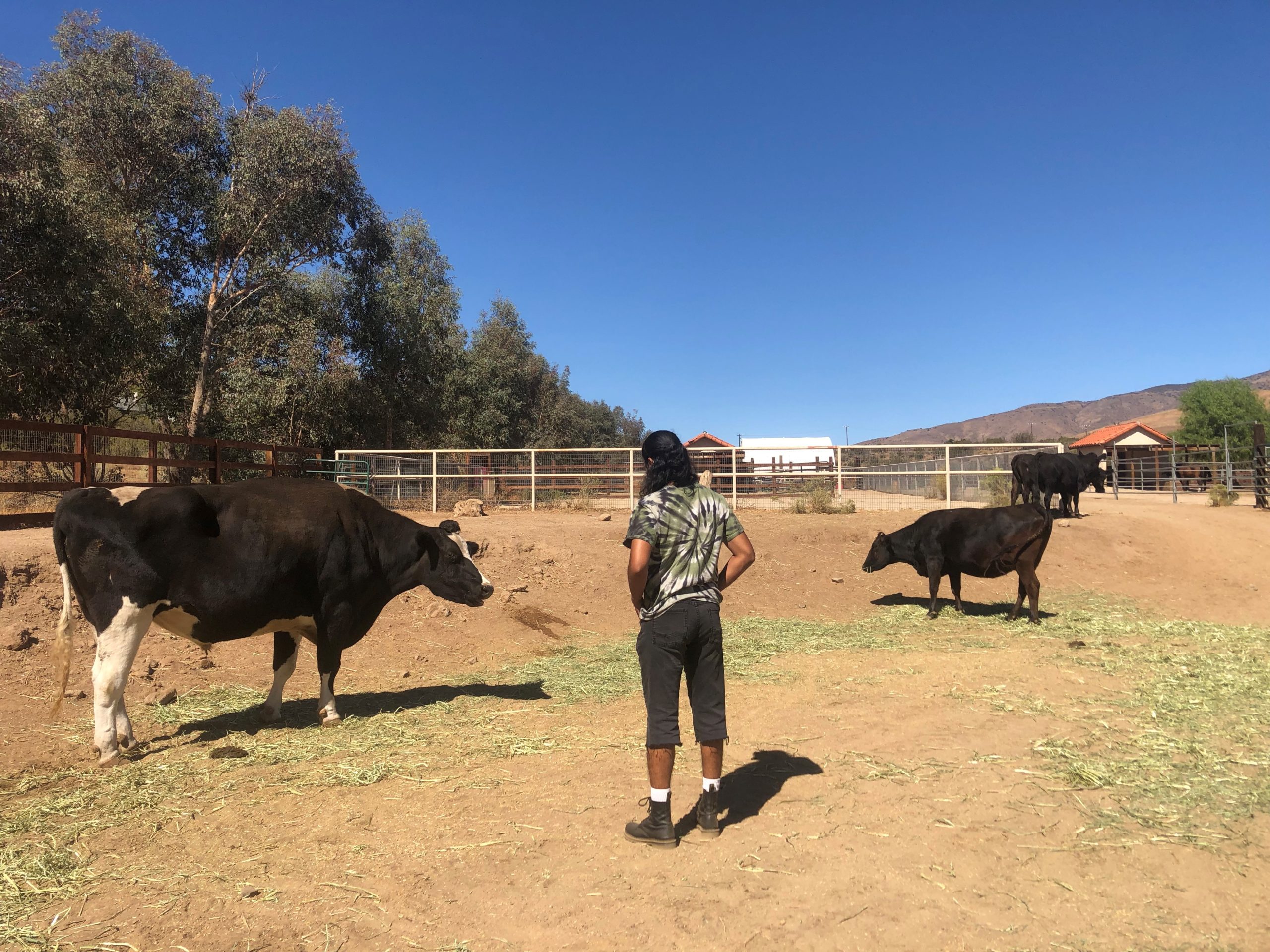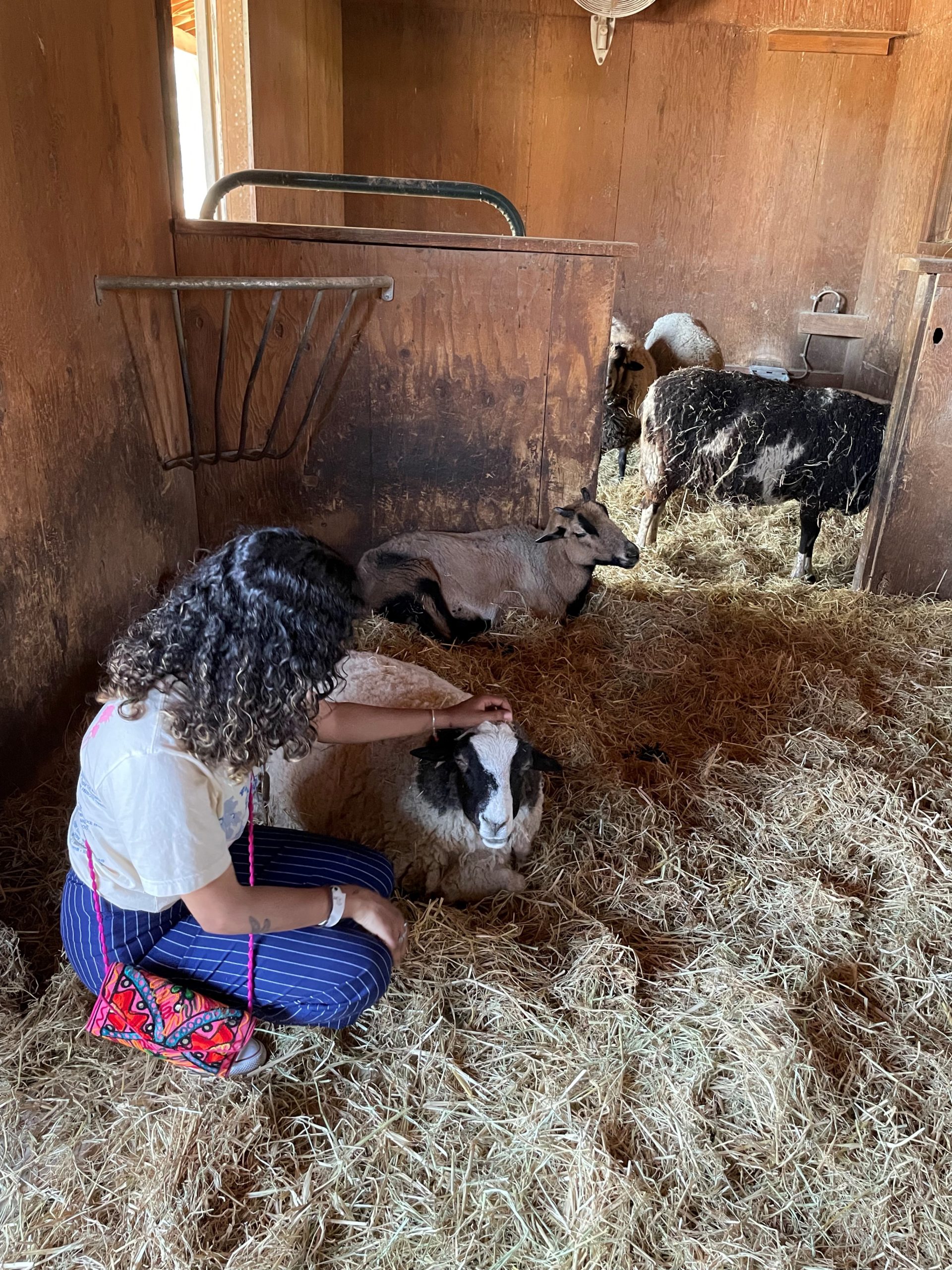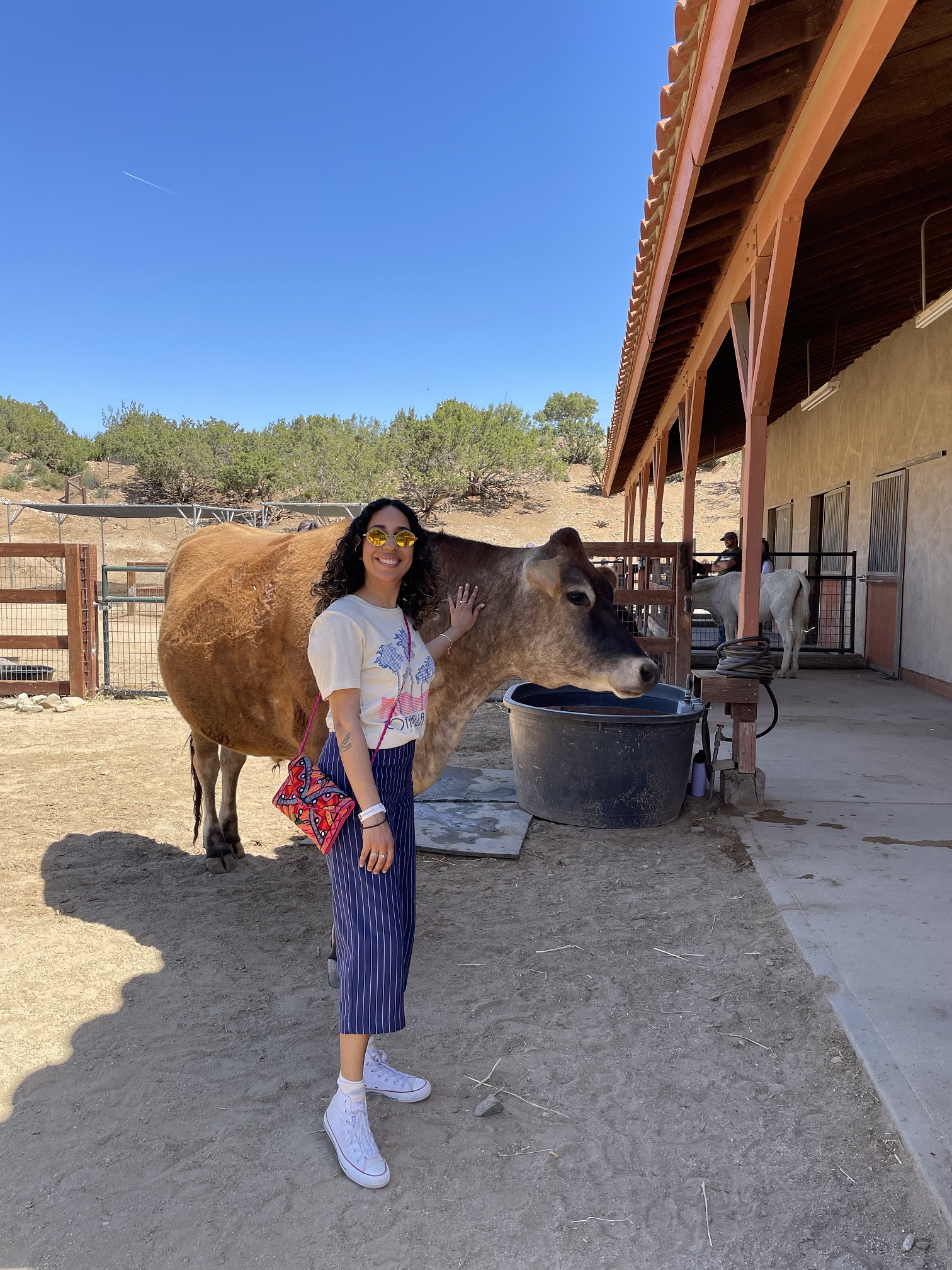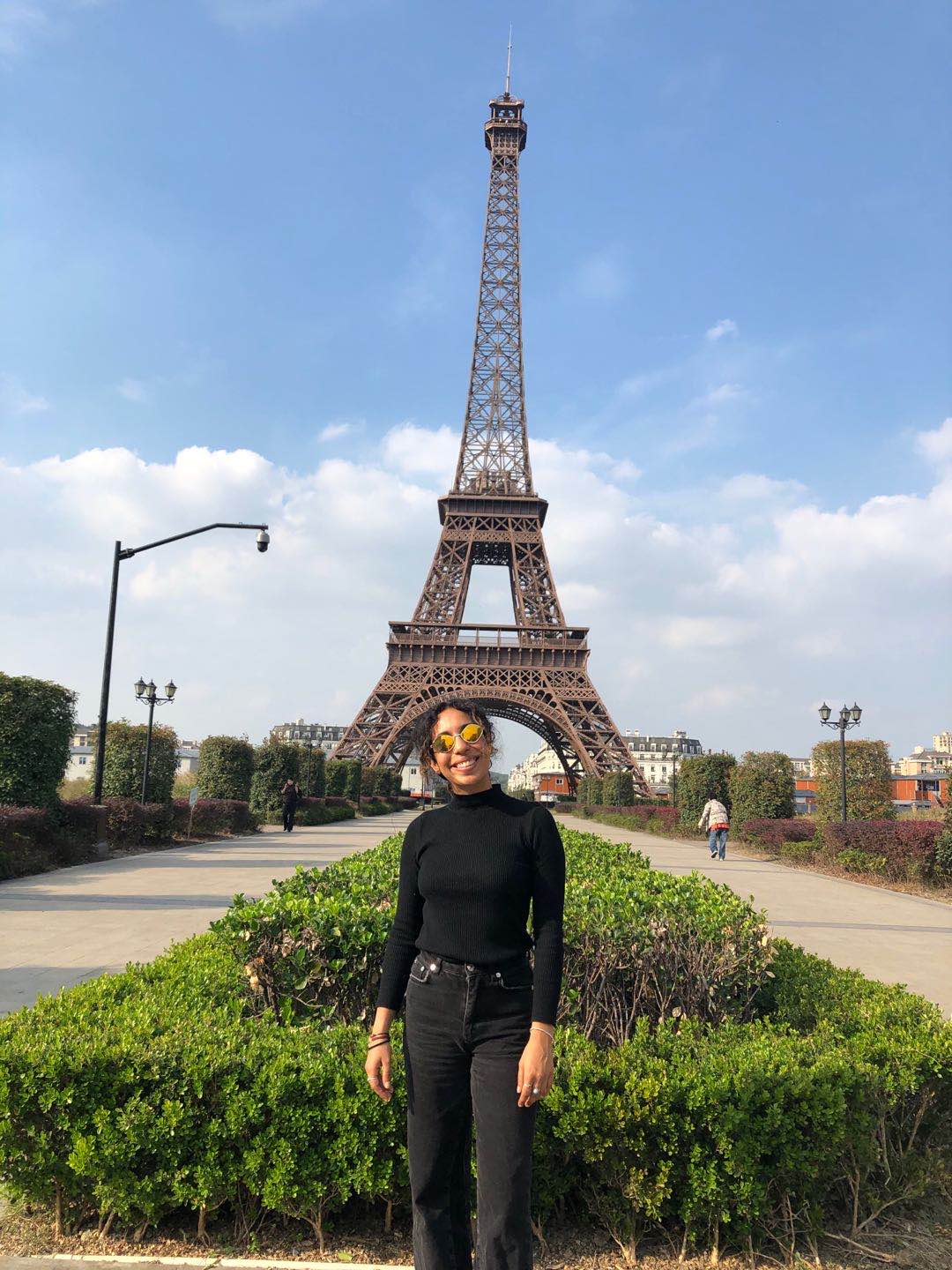

a human man and a nonhuman friend.
—
I didn’t grow up in a community that was well-rounded in animal sentience. I grew up with companion animals, dogs mostly, and a few birds here and there, but even those relationships had their limitations. Dogs lived outside and humans inside. Dogs didn’t feel emotions as profoundly as we did. Dogs, or any other animal we housed, are not a part of the family, per se. They held their role within the family unit which was to take care of the house, obey the rules we put in place, and so forth, but they never were fully integrated into the family as modern-day pet owners integrate their companion animals. Times are different now and remain much distinct to a 90’s immigrant family whose integration into US culture grew gradually. With a lot of that influence coming from first-generation children. Hence, me.
I make it sound far worse than it was. We loved our companion animals growing up, all of us. We attended to their wounds and took notice of their emotions and did what we could to help ease their discomfort. We always registered them with our local animal protection services, took them to every routine check-up, and vaccines were always up to date. Stuff like that. However, my parents didn’t grow up in the city, nor did they grow up in the US for that matter, and their relationships with animals were far different and far removed from the care they provided to our four paw family members growing up. They instilled in us the importance of doing things by the book, and that extended to our nonhuman friends as well. It was a responsibility, after all, and needs need to be met. Here is where the silver lining lies.
Regardless of this, there was still a clear divide and a clear separation between sentience. Thus, regularly justifying the feelings of humans to be far more developed and important than that of nonhuman animals.
“It’s just an animal” was a phrase I could never escape growing up. As a child leading into my young adult years, there wasn’t much I could do to change that.
I thought my discomfort with this phrase would go away with time. But alas, I am a big ol’ softy and with age, life lessons, and exposure that softness has turned into a big ol’ goob of empathy that only expanded with time.
Empathy: Empathy is the capacity to understand or feel what another person is experiencing from within their frame of reference, that is, the capacity to place oneself in another’s position. Definitions of empathy encompass a broad range of social, cognitive, and emotional processes (Wikipedia)
I went on to post-graduate studies to explore, unpack, and understand the collective web that is humanity and all the pieces: people, habitats, species, and biodiversity that get caught in our sticky web of, well, compliance, ignorance, pride, ego, money, society, normalcy, perceived fixed mindsets, and fixed systems. It’s all connected in a big web. In this program, I not only learned about the systemic issues perpetrating harm and cruelty and the root causes of most issues, but I also bore witness. That was rough. Watching, reading, and hearing, gruesome screams, yells, and stories, about humans, nonhuman animals, and the environments suffering all at the hands of humans was traumatic and extremely motivating.
It hasn’t always been easy, managing my relationship with animals, and I’ve learned some hard lessons along the way. Travel definitely put me in clear sight of cruelty done to animals. With no direct education on animal welfare or how to critically analyze situations regarding animals, it was hard to understand what I could, should, or must do in certain instances. Some things I would witness, like dog farms on my daily commutes to work or other things I rather not mention, would leave a bitter taste in my soul. But other than staying clear, not participating, and continuing walking there was little to nothing I could do about it. There was no path I could easily rely on for guidance. So, I’ve effed up a few times myself. Bathing elephants in Thailand is a distinct marker of that mess up. Somehow, not inflicting pain directly onto the other being wasn’t enough to keep me going about my way.
I looked back, and I never stopped.
Although I’m only one person and my capacity is very limited as most of ours are, our voices and actions still do ripple and impact each other whether we think about it or not. Whether we choose to be mindful of it and responsible for it, or not. We, what I/you do, what I/you buy, where I/you buy, who or what I/you support not only affect me/you directly but affect other groups of people all over the world that we may not even be aware of, it affects a family somewhere in Latin America or Asia or wherever it may be, it affects both domestic and wildlife in more than just that region, it affects our relationships with animals as needs and resources fluctuate and creativity gets the best of us, it affects the plants or animals that are fed on in the natural symbiotic relationships of those animals, which affects entire habitats, plant species, climate, and survival rates of every living thing, including ourselves: humans. Whether we are conscious of it or not, these ripples are happening. Every day.
If you haven’t yet noticed, I can go on and on about these topics. And I find it really difficult to only brush the surface of these complex and infinitely intertwined realities. Because they are real, maybe not to you but to someone like you, to someone who also feels and senses and fears. Whether they are far or near, whether we can visually see them or not, the realities exist. And it’s not always fair. So what can we do about it from where we stand globally and physically?
Years ago I vouched to never go to a zoo or participate in animal activities that included exploiting animals in any capacity. Conditions such as stripping animals from their natural habitats and/or performing for human entertainment are just a few of the industries where rights are violated and depend on animal exploitation.
It was the least I could do. It’s definitely not the only thing I can do or will do. But it’s an easy start I think everyone as privileged as I am can commit to.
But as I mentioned earlier, I love animals. I want to interact, witness, observe and simply be in presence of animals I find exquisite. But do they want to be held in captivity for me to do so? Do they want to be captured, bred, and chained for me to take a photo at a zoo, go to a circus, or visit a controversial travel adventure that involves feeding, petting, playing, or any physical interaction with a wild animal? If they belong in the forest, they should be able to live their life in the forest. Right?
Do I want to support a cruel industry that earns millions if not billions of revenue at the expense of animal safety and welfare? Are the fear, pain, and suffering inflicted on these animals for my benefit something I want to be a part of or support? This goes beyond actively participating in a controversial activity. It also is connected to where we shop. Who produces the products we purchase? Where did they come from and who are the stakeholders in this production line? What is their story, the real one?
Well, there are ways to be around animals and still feed that “aweness” we crave to fill in an ethical way. There are organizations all over the world already doing this amazing work.
For example, instead of visiting a zoo that is well-known to be a controversial location for animal welfare (I’ve learned directly from former employees, researchers, and professionals in this industry), we came here instead. A Farm Sanctuary in which its ethos aligns with its actions and offers full transparency of its work and mission to us, the supporters.



The best part of this experience is that we embraced a space where our coexistence was equally respected. Understanding as well, that as visitors to this place, we are entering someone else’s home and therefore space and awareness of both needs and behaviors for the residents and for ourselves are crucial. But of course, we are no experts in all these differing and emerging needs. So we booked a group tour with the sanctuary which was guided by an employee that lives, breathes, and cares for these animals every day, a professional. We learned the stories of most individual animals, how they got to be residents there and their background stories. It was moving. I returned to Farm Sanctuary a second time and every visit had been renewed. A beautiful reminder of my love, a way to interact and honor other nonhuman animals all while supporting an organization that is re-educating the way we interact with animals. Both at the sanctuary and in our daily lives.
When we aren’t physically in spaces that offer a visual or tangible interaction with others, it’s important to remember that still, we all exist symbiotically, on one planet. Thus, are interconnected in every way. So remember when you shop at your grocers, and fashion stores or participate in tours during your travels, we are connected. The actions we have the power to make and the ways we choose to live are connected to them. To everything.

Author
Natalie Amezcua








0 Comments